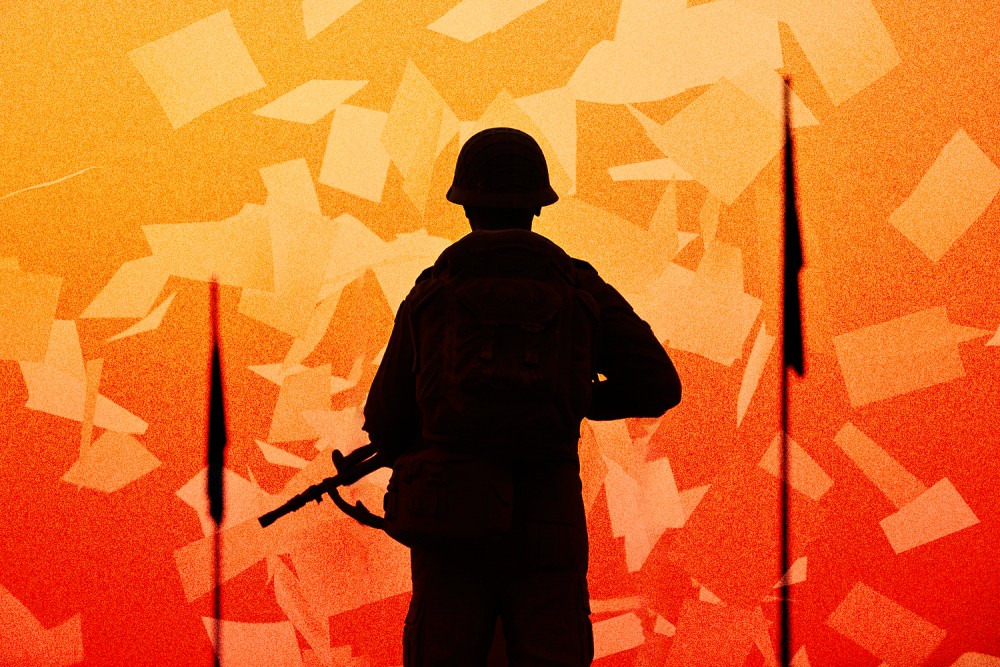What comes after a ceasefire?
Netanyahu’s poor leadership is a symptom of larger problems that undermine the long-term prospects for peace between the Israelis and Palestinians.

Century illustration (Source images: Getty)
On October 7, Hamas terrorists brutally attacked several towns in southern Israel, killing 1,200 people—including many children—and kidnapping 240. The assault spurred Israel to launch a massive war in Gaza, with the stated goal of rescuing the hostages and obliterating Hamas. That war’s toll has been staggeringly high. An estimated 40,000 Gazans have been killed, most of them civilians and more than 16,000 of them children. Half a million more are on the verge of starvation, and most of Gaza’s homes, social institutions, and public infrastructure have been destroyed. Meanwhile, 109 of the hostages kidnapped by Hamas remain in Gaza. More than half of them are thought to be still alive.
Munther Isaac, a Palestinian Lutheran pastor in the West Bank, recently spoke with the Century about the shape of ministry in occupied territory so close to a war zone. He described the hardship of life in the West Bank, due to Israel’s blockades and violence by Israeli settlers. He told harrowing stories about Christians in Gaza dying due to medicine shortages, collapsing from dehydration and malnutrition, and being shot and left to bleed to death in the street. He characterized Israel’s long-standing occupation of the West Bank as apartheid and the war in Gaza as genocide.
These are deeply controversial terms. In the case of apartheid and genocide alike, a narrow legal definition exists in tension with broader, contested popular usage. Both terms carry tremendous moral weight and the power to catalyze action. But the debate over whether it’s fair to apply such language to Israel ultimately matters less than the underlying reality: Palestinian suffering and disenfranchisement are not mere side effects of Israel’s West Bank policy; they’re part of the point. And Israel’s war in Gaza has placed a shamefully low value on the lives and welfare of civilians.
Both of these projects are taking place under the leadership of Benjamin Netanyahu, whose six terms as prime minister have shown him to be relentlessly self-serving and increasingly willing to form coalitions with ultranationalist politicians in order to retain power and avoid criminal prosecution. His antidemocratic judicial reforms, his use of settlement policy to forestall Palestinian statehood, his reliance on advisers who call for the mass killing of Palestinians—all this has devastated Israel’s moral position and sabotaged the prospects for peace in the region. The war in Gaza—which at this point Netanyahu appears to be prolonging simply to maintain his tenuous hold on power—may promote Israel’s short-term security, but at a tremendous cost. In addition to its mass civilian casualties, the war is destabilizing Israel’s longer-term security—and causing moral injury to the Israeli soldiers who treat Palestinians in a way that denies God’s image in them.
Netanyahu has done a singularly poor job of leading Israel, but he is also a symptom of a larger problem, one that has long undermined Israel’s efforts to be a Jewish democracy in a region hostile to its existence: the deep power imbalance between Israelis and Palestinians. It’s past time for a ceasefire, for an end to the immediate conflict. But there will be no lasting peace until Israel recognizes the full humanity of Palestinians and treats them accordingly. As Isaac told the Century, “Israel has to decide, because they hold the keys to the region.”





